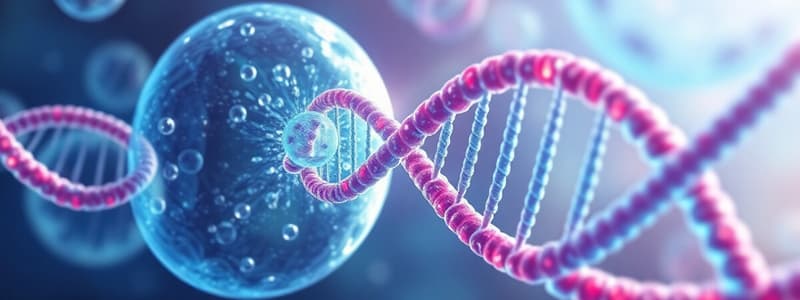Podcast
Questions and Answers
What is the main purpose of selective gene expression in cells?
What is the main purpose of selective gene expression in cells?
- To ensure each cell type only expresses genes relevant to its function (correct)
- To enable mutations to occur in every cell type
- To allow all genes to be expressed at all times
- To prevent cells from ever using the same genes
In mitosis, how many daughter cells are produced?
In mitosis, how many daughter cells are produced?
- Two identical daughter cells (correct)
- One identical daughter cell
- Four genetically unique daughter cells
- Three haploid daughter cells
What distinguishes meiosis from mitosis?
What distinguishes meiosis from mitosis?
- Meiosis produces 2 diploid daughter cells
- Meiosis takes place in somatic cells
- Mitosis involves two rounds of division
- Mitosis produces cells with the same chromosome number as the parent (correct)
What process occurs before both mitosis and meiosis?
What process occurs before both mitosis and meiosis?
Which of the following statements about DNA replication is true?
Which of the following statements about DNA replication is true?
What is the end product of meiosis?
What is the end product of meiosis?
What is a key enzyme involved in DNA replication?
What is a key enzyme involved in DNA replication?
What is the significance of genetic diversity produced by meiosis?
What is the significance of genetic diversity produced by meiosis?
What happens to genes not needed by a cell?
What happens to genes not needed by a cell?
Which of the following statements is true regarding the gametes produced in meiosis?
Which of the following statements is true regarding the gametes produced in meiosis?
Flashcards are hidden until you start studying
Study Notes
Gene Expression
- Each cell type uses only the genes that are relevant to its function, despite all nucleated cells having the same genes.
- Red blood cells are the only cells that contain hemoglobin, though all body cells have the hemoglobin gene.
- Regulatory substances control selective gene expression.
- Genes are kept switched off when they are not needed by a cell.
Spot Check Answers
- The complementary RNA base sequence for ATTGAC is UAACUG.
- A codon is a sequence of three bases on an RNA molecule that codes for a specific amino acid.
Cell Division
- Most body cells can divide, even in adulthood.
- Mitosis produces two identical diploid daughter cells and is critical for growth and repair.
- Gametes are produced by meiosis, which results in daughter cells with half the number of chromosomes.
- Gametes are haploid, containing 23 chromosomes instead of 46.
DNA Replication
- DNA replication is the process by which DNA makes an identical copy of itself.
- Mistakes in DNA replication can lead to non-functional cells, poorly functioning cells, or cells that ignore cell controls, potentially leading to tumor development.
- During DNA replication, the double helix unfolds and the two strands unzip to expose the bases.
- The enzyme responsible for DNA replication moves along the base sequence, reading the genetic code and adding the complementary base to the new chain.
- Two identical DNA molecules are formed as each strand of exposed bases becomes a double strand.
- Other enzymes cause the new double strands to twist and coil back into their highly folded form.
Mitosis
- Mitosis is a type of cell division that produces two daughter cells that are genetically identical to the parent cell.
Meiosis
- Meiosis is the final step in gamete production.
- When a sperm cell and an ovum unite, the resulting zygote is diploid since each gamete was haploid.
- Meiosis involves two distinct cell divisions, unlike mitosis.
- Meiosis produces four daughter cells, all different from the parent cells and from each other.
- Genetic diversity and the unique character of each human are determined by meiosis.
Studying That Suits You
Use AI to generate personalized quizzes and flashcards to suit your learning preferences.




